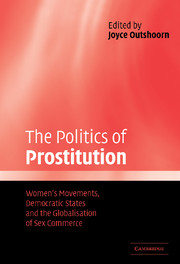 The Politics of Prostitution
The Politics of Prostitution Book contents
- Frontmatter
- Contents
- List of figures
- List of tables
- Notes on contributors
- Preface
- 1 Introduction: prostitution, women's movements and democratic politics
- 2 The women's movement and prostitution politics in Australia
- 3 Taxes, rights and regimentation: discourses on prostitution in Austria
- 4 Prostitution policies in Britain, 1982–2002
- 5 Prostitution as public nuisance: prostitution policy in Canada
- 6 Towards a new prohibitionism? State feminism, women's movements and prostitution policies in Finland
- 7 Prostitute movements face elite apathy and gender-biased universalism in France
- 8 The politics of prostitution and trafficking of women in Israel
- 9 Italy: the never-ending debate
- 10 Voluntary and forced prostitution: the ‘realistic approach’ of the Netherlands
- 11 State feminism and central state debates on prostitution in post-authoritarian Spain
- 12 Criminalising the john – a Swedish gender model?
- 13 The invisible issue: prostitution and trafficking of women and girls in the United States
- 14 Comparative prostitution politics and the case for state feminism
- Appendix 1 Independent variable indicators
- Appendix 2 Worksheets
- References
- Index
8 - The politics of prostitution and trafficking of women in Israel
Published online by Cambridge University Press: 22 September 2009
- Frontmatter
- Contents
- List of figures
- List of tables
- Notes on contributors
- Preface
- 1 Introduction: prostitution, women's movements and democratic politics
- 2 The women's movement and prostitution politics in Australia
- 3 Taxes, rights and regimentation: discourses on prostitution in Austria
- 4 Prostitution policies in Britain, 1982–2002
- 5 Prostitution as public nuisance: prostitution policy in Canada
- 6 Towards a new prohibitionism? State feminism, women's movements and prostitution policies in Finland
- 7 Prostitute movements face elite apathy and gender-biased universalism in France
- 8 The politics of prostitution and trafficking of women in Israel
- 9 Italy: the never-ending debate
- 10 Voluntary and forced prostitution: the ‘realistic approach’ of the Netherlands
- 11 State feminism and central state debates on prostitution in post-authoritarian Spain
- 12 Criminalising the john – a Swedish gender model?
- 13 The invisible issue: prostitution and trafficking of women and girls in the United States
- 14 Comparative prostitution politics and the case for state feminism
- Appendix 1 Independent variable indicators
- Appendix 2 Worksheets
- References
- Index
Summary
Introduction
Historically, up until the 1990s, prostitution was not a politicised issue in Israel. However, since the 1990s, trafficking in women for prostitution purposes emerged, as in many other countries, as the most important issue on women's agenda – violence against women. The old and new women's movements, NGOs and women in the Knesset (parliament) and in government succeeded in mobilising the public and pressuring parliament to enact laws against trafficking and traffickers and to render special services to trafficked women.
This relative success can be attributed to several factors, among them the vocal position of the Parliament Commission for the Status of Women, the mobilisation of citizen's advocacy groups for foreign labourers' rights (including those of trafficked women) and broadening of the definitional umbrella of ‘violence against women’ to include trafficking.
Israel is a society of immigrants from all ‘corners of the world’. Each wave of immigration (e.g. one million Russians since 1988) included practising prostitutes, while the marginal status of the newcomers and their economic hardships increased the number of women who viewed prostitution as their only way to survive. Moreover, global movements of labour have not bypassed Israel (200,000 to date), among them a sizeable number of women trafficked for prostitution purposes (2,500–3,000 prostitutes annually). Many, ‘lured’ by promises of legitimate earning opportunities, found themselves forced into prostitution. Most of the women come from the former Eastern bloc, mainly Russia, Ukraine and Moldova (for statistics: Levenkron 2001).
- Type
- Chapter
- Information
- The Politics of ProstitutionWomen's Movements, Democratic States and the Globalisation of Sex Commerce, pp. 144 - 164Publisher: Cambridge University PressPrint publication year: 2004
- 9
- Cited by


